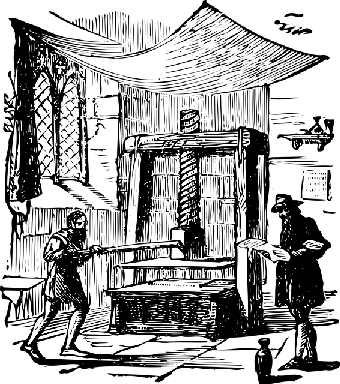Over the next ten years Tyndale moved from place to place according to where the needs of his work or security demanded. He may have spent a period at Wittenburg with Martin Luther. By 1525 he had completed his translation of the New Testament and was in Cologne supervising its printing. In an essentially Catholic city this was a dangerous enterprise. It is reckoned that careless talk in the print shop gave the game away. Tyndale took what was already printed and fled to Würms. The few pages that had been printed were mainly the gospel of St. Matthew and are known as the "Cologne fragment".
It was in Würms in 1526 that the complete text of the New Testament was printed, the first New Testament in English to be mass produced using the printing press rather than being laboriously hand written.
The leading Tyndalian scholar, and founder of The Tyndale Society, the late Professor David Daniell repeatedly drew attention to the features of Tyndale's work that make it so much more than just a translation of the New Testament into English, so important though that was in making the Bible accessible. In order to do this work Tyndale learnt Greek so that he could translate from the original language. He also used the Latin Vulgate of St. Jerome and the German translation by Martin Luther but essentially his work is based on the original text in so far as Erasmus had been able to compile this. Further significance of this translation lies in it showing the possibility of using the English language for a book of significance, rather than Latin or French as had been the custom. Tyndale's direct English makes his translation very readable even today and he added many words and phrases to the developing English language.
By now Tyndale was also writing a series of works both outlining his criticisms of the church as he found it and expounding his theological position. Though influenced in some respects by the teachings of Martin Luther he was no slavish Lutheran, even though that term has often been applied to him from the sixteenth century to the present day. In addition he had somehow managed to learn Hebrew and was working on translating the Old Testament with the aim of publishing a complete Bible in the English tongue.
In these years it is not always clear where he was living and working. He certainly spent some time in Antwerp but at other periods his whereabouts are unknown. Once his New Testaments began to enter England, William Tyndale was no longer an obscure scholar. He was now of concern to the authorities. His translation was burnt at St. Paul's Cross, as Luther's writings had been five years earlier. Attempts were made to persuade him to return to England, whether so that the king might use his talents or simply burn him is not always clear. Tyndale suspected the latter and so was wary of doing the king's command. He always maintained that he was loyal to the king but suspected that, if he returned, the bishops would persuade Henry to treat him badly. He also wanted from Henry an assurance that the king would allow the Bible in English.
Tyndale well knew the dangers of returning. He was engaged in a fierce written dialogue with Sir Thomas More, Lord Chancellor and pursuer of heretics, who made his views of Tyndale's theology very clear. In England men who were sympathetic to Tyndale's ideas, who were involved in book smuggling and distribution, and some of whom had been with him on the Continent, were being burnt at Smithfield. Even his old patron Humphrey Monmouth was taken in for questioning about his support of Tyndale. To be associated with Tyndale or his writings was now dangerous. No wonder that the man himself thought it wisest to remain "in the parts beyond the seas".
From late 1529 Tyndale was back in Antwerp. From here the following year the first part of his Old Testament translation from the Hebrew began to be taken into England, the five books of the Pentateuch, the only part of the Old Testament to be published in his lifetime.
© Brian Buxton 2013
 Early Gutenberg printing press
Early Gutenberg printing press